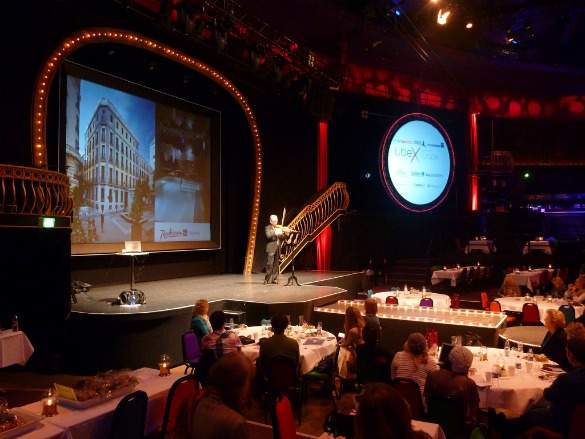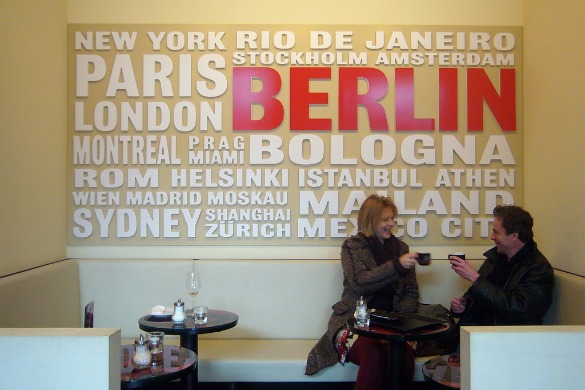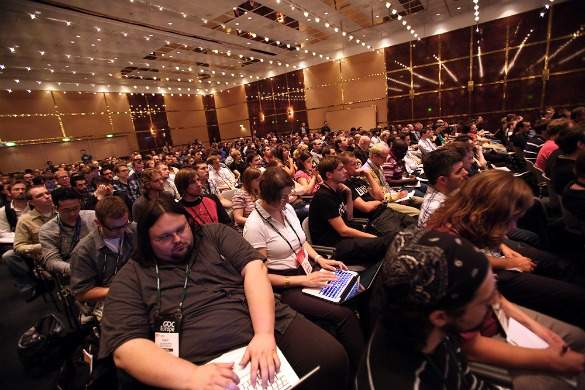As a freelance travel writer, I spend quite a significant amount of time by myself, writing. Believe it or not, travel writing does involve traveling, but one way or another, you need to plunk down and actually write. Thus while I do interact with locals and fellow travelers, it is rare that I get to meet other travel writers and editors.
This is where conferences and trade shows come in. Held all throughout the world, such events are unique networking opportunities where travel writers can make invaluable contacts. Putting a name to a face can be incredibly powerful, and move your income up a notch if you’re an established writer. And if you’re just starting out, travel writing conferences can help you begin to make contact with others in the industry and provide great tips to improve your skills and how you market them. Given the multitude of conferences and trade shows that exist today, here are a few tips to get you started.
Conference vs. trade show
Just a quick clarification before we get into the nitty gritty details: while a travel writing conference involves travel writers who speak about their craft, a trade show will involve tourism professionals who seek to promote their services and/or products. The latter is also often referred to as a trade fair or exhibition or expo. There may be overlaps between the two, and often major industry players sponsor a conference, but this is the essential difference. Thus when you begin looking for an event to attend, consider whether it should be a conference or a trade show. It may even be both, but for different reasons.
Choosing the right event
Before you even start Googling, think about your writing goals and how a conference or trade show will serve to achieve them. What kind of a travel writer are you? Which writers do you admire? Are you seeking to improve your writing skills? Or perhaps your photography talent? Do you focus on backpacking or luxury vacations? Are you a blogger or do you want to write for print magazines or newspapers? Are you reviewing gear or writing travel memoirs?
At this point, you may be a combination of the above, which is not a problem. Just reflecting on what it is that you do already and what you want to do in the future can be useful before you start. Jot a couple of ideas down, and keep them with you throughout your search.
Beginning your search: Factors to consider
Thanks to the Internet, you won’t need to leave your house to begin looking. A simple Google search for “travel writing conference” or “travel trade show” will yield a plethora of results. Now it is your turn to filter them. Here are some factors to consider.
- Location: Where is it and how will you get there? If it is far away, does it serve your interests to trek halfway across the world for this event?
- Program duration: How long is the event? Can you combine it with any other professional and/or personal visits?
- Program content: Is there a keynote speaker? Are there break-out sessions? Are there any pre- or post-tours or socializing activities?
- Size: How many people will be attending? Will it be possible for you to network with other writers and editors in-person?
- Individual mentoring sessions: Are there any? How do you sign up for them? And how much do they cost?
- Cost: How much does it cost? Are there scholarships available? Is there an early bird rate?
- Destination presenters: Are there any and do they serve your interests?
In most cases, all of the above should be listed on the respective event website. If not, feel free to shoot the organizer an email and inquire about more information. The way in which he or she responds will also give you an insight into how the event is run.
Sometimes, it won’t be you who choose the event, but the event that chooses you. That is, some conferences or trade shows require you to be a professional of a certain degree, and will ask you for evidence. Travel Classics, which organizes conferences that pride themselves on small size, requires that you have at least three magazine articles published. Sometimes, this can be substituted with a book project. But especially since the conference involves free seven-day pre and post familiarization tours, the organizers want to make sure that there are no beginners who just want to come along for the free ride. If you are unsure whether you qualify, send an email with your qualifications to Maren Rudolph (maren@travelclassics.com), and she will tell you right off the bat.
Getting a ticket
Once you have chosen an event, you will need to get a ticket. Sounds obvious, but often tickets sell out pretty fast. What to do if you waited too long to register?
- Check the waitlist. Usually you can inquire with the event organizer about this. At some conferences, such as TBEX 2011, there is an automated waitlist on the registration website.
- Look for tickets on Facebook and Twitter. For the former, go to the event’s Facebook site and post on the wall. For the latter, use the hashtag for the respective conference. I recently inquired about a TBEX ticket on Twitter using #tbex and got three responses right away. Just make sure to find out whether a ticket is transferable before money changes hands.
If you still can’t get a ticket or can’t go for another reason, there are ways to get something out of the conference even if you don’t attend in person. This will depend on the specific event at hand, but usually, there will be a website with accompanying content. Whether text, photos and/or videos, a summary of the main presentations will usually become available in some form or another. Some events may even offer Live Streaming. You can also follow what’s being said by searching the respective hashtag on Twitter.
But the event’s website isn’t the only place to get a recap. Since the attendees involve writers and journalists, they like to write about what happens. For example, BootsnAll published several recaps about TBEX. While it is impossible to anticipate who will be writing about a particular conference or trade show, a post-event search can prove useful.
Preparing for the event
Getting ready for a conference and/or trade show involves more than purchasing a ticket. To make the most out of the event, be sure to prepare the following:
- Business Cards. Kristina Wegscheider of Do It While You’re Young has published a very useful article on “How to Create a Travel Business Card.” While her article applies to travelers in general and not specifically travel writers, she does make several recommendations that can apply to the latter. For example, at moo.com, you can print photos of different travel locations on the back of your cards. If you want a personal touch that an editor will remember, this might be something to consider. Just make sure to keep it professional at all times.
- Portfolio. As freelance writers, we become used to referring people to our website, or the Internet in general, for samples of our work. However, when you are attending a conference, it is advantageous to have printed copies of your work at hand, especially if you are going to participate in a one-on-one critique session, such as those offered at the Book Passage conference in San Francisco. Be sure that the paper is good quality and include an updated resume as well.
- Forms. Again, this will vary from event to event, but usually the organizers will ask you to fill out some kind of form prior to arrival. Treat the organizers with respect and professionalism, and make sure to submit it on time. Believe it or not, they will remember who they had to chase for days on end about their bio, and in the end, you will be the one who looses if it doesn’t get published, or if they make a negative remark about you to one of the editors.
- Networking. Yes, you are going to the event to network. But the process can start before. Again, start contacting people via Twitter and Facebook. Sometimes, there will even be a list of delegates and/or attendees published online beforehand, so you can use email or a forum directly. This will make it easier to approach fellow writers and/or editors at the event. You can also organize logistical questions, like sharing a cab from the airport or spending a few days together before the event to get to know the area.
During the event
How an event unravels will depend on the organizers, but in part, it will also depend on you. No matter whether you are generally a timid person or the one who enjoys being the center of attention all the time, here are some tips for all:
- Listen. Don’t just talk about yourself. Also, don’t be texting on your BB or iPhone all the time. You came here to be here.
- Behave professionally. This is a conference, not a party. Control how much you drink in the evening, and don’t hit on your prospective employers.
- Take advantage of individual critique sessions. This may or may not be possible, but inquire beforehand to make sure you have secured a spot.
- Sharing a room. This can allow you to get to know a fellow writer, but can also go incredibly wrong. If possible, get to know the person in question beforehand and choose wisely.
- Focus on making a few key contacts. This applies especially if the conference is very large. Don’t try to meet everybody, but make a few quality connections. If a list of attendees is published beforehand, you can even pick out a few prior to arrival.
After the event
Attending a conference or trade show is supposed to have long-term benefits. You can optimize your goals by:
- Keeping in touch with editors. Send them a note after the event, saying it was great to meet them and that you look forward to working with them. Take this opportunity to follow up on queries and pitches you mentioned during the event. Propose specific ideas. And thank them for their time.
- Keeping in touch with fellow writers. Again, you can send them a message after the event. Whether you choose to do this via email, Facebook and/or Twitter is up to you, just make sure to keep it professional at all times.
- Thanking the organizers. This is a detail that few attendees pay attention to. Sending a quick thank you note to the person in charge can go a long way. Not only will they remember who you are, but you can take the opportunity to propose suggestions for the next event. Offer constructive criticism instead of saying “I didn’t like so and so’s speech.” Who knows, you may find yourself playing a key part in the organization of the next event if you propose good suggestions.
Useful Links
Conferences:
Travel Bloggers Exchange. An annual event hosted by Kim Mance of Galavanting TV and sponsored by BootsnAll. This year’s conference is scheduled for Vancouver from June 11-12. A TBEX Europe location is still being decided for later on in the year. As the title states, the conference specializes in topics for bloggers.
Book Passage Travel, Food and Photography Conference. Held in San Francisco from August 11-14, this conference will include high profile speakers such as Tim Cahill, Catharine Hamm, David Farley and Lonely Planet’s Don George. The latter is a regular at Book Passage, and also teaches an intensive travel writing course there. This conference addresses writing for different outlets, including magazines, newspapers and online media. You can also book up to three individual critique sessions with your favorite editors. First come, first served.
Travel Classics Conferences. Travel Classic hosts two conferences annually, one in North America and one in Europe. This year, it’s Dublin from June 23-26 and Vancouver from October 6-9. In both cases, you have to be a professional writer and apply for one of the few spots (usually 35-40 writers and 10-15 editors). The conference also partners with tourism operators, and the Dublin event, for example, will involve seven days touring around the castles and coasts.
Travel and Words Conference. Unlike Travel Classics, this conference welcomes writers of all levels. Held at the Willows Lodge in Washington, it will feature presentations by bloggers, magazine, newspaper and book authors. Read about the top 10 reasons to attend here.
Travel Bloggers Unite. Again, as the title says, this conference is for bloggers. There was an event in Manchester in March already, and another one scheduled for Innsbruck in August.
Other events to consider are those organized by writers associations, such as the North American Travel Journalists Association, the Society of American Travel Writers and the American Society of Journalists and Authors. All three organize annual conferences, yet be aware that the latter targets writers in general and not only travel writers.
Trade shows:
In terms of trade expos, the Travel Media Showcase and Travel and Adventure Show are probably the most comprehensive. While the former is held only once, the latter moves from Atlanta, Dallas, LA, New York, Chicago, San Francisco and Washington D.C. Newspapers, too, host their own exhibitions, such as the NY Times Travel Show and the LA Times Travel Show. For social media professionals, SXSW might be a good option. Further worldwide travel trade show listings can be found at Biz Trade.
For more on TBEX:
- Things You Need to Know About TBEX 2011
- TBEX 2010 Wrap-Up and Photos
- Lessons Every Travel Blogger Can Learn From TBEX
Photos by: Paul Brady, Galerist van GALERIEopWEG, GDC Europe, Lars Plougmann,



